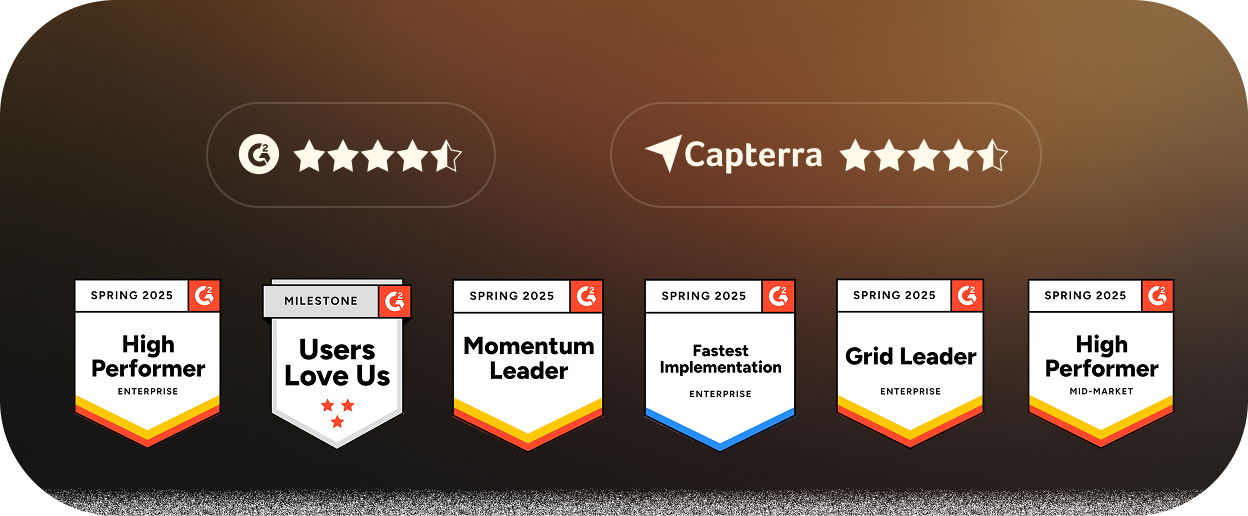
Glossary Terms
Plum - Rewards, Incentives and Payouts Platform
Service Rewards
Service rewards are a crucial component of employee recognition programs designed to acknowledge and celebrate the dedication, commitment, and contributions of individuals within an organization. These rewards go beyond monetary compensation and play a vital role in enhancing employee morale, engagement, and overall job satisfaction.
What are service rewards?
Service rewards are recognition programs used by organizations to appreciate employees for their long-term dedication and continuous service. These rewards honor milestone achievements or significant contributions over time.
They go beyond regular compensation by offering tangible acknowledgments or experiences to show gratitude, boost morale, and foster a positive workplace culture.
Are survey rewards legit?
Yes, survey rewards can be legitimate when offered by reputable companies or research platforms. However, users should verify the source and avoid sharing sensitive information to protect against scams.
What milestones are typically recognized in service reward programs?
Service reward programs celebrate employee loyalty by acknowledging key career milestones. These recognitions show appreciation for long-term commitment and achievements.
- Work anniversaries: Employees are rewarded at key service intervals such as 1, 3, 5, 10, 15, 20, or 25 years with the company.
- Retirement milestones: Employees reaching retirement age or tenure are often honored with special rewards or ceremonies.
- Promotions and role advancements: Recognition is given when employees move into higher roles or leadership positions.
- Project completion: Significant project achievements or contributions may be acknowledged with service-related rewards.
What are the key components of service rewards programs?
Key components of service rewards programs:
- Longevity recognition: Longevity awards are given to employees for their continuous service to the organization. These can include milestone celebrations for specific years of service, such as five, ten, or twenty years.
- Performance recognition: Service rewards can be tied to exceptional performance and achievements. Employees who consistently exceed expectations or make significant contributions may receive special recognition.
- Personalized acknowledgments: Recognizing the individual preferences and interests of employees adds a personal touch to service rewards. This might involve offering personalized gifts, experiences, or extra time off.
- Professional development opportunities: Providing opportunities for continued learning and professional development demonstrates a commitment to an employee's growth. This can include sponsoring courses, workshops, or conferences.
- Flexible work arrangements: Acknowledging long-term commitment with flexible work arrangements, such as telecommuting options or adjusted work schedules, can be a valuable service reward.
What types of rewards are commonly offered in service recognition programs?
Service recognition programs commonly offer a variety of rewards to acknowledge and appreciate employees' dedication and tenure. Common reward types include:
Service recognition programs often include a mix of tangible and experiential rewards to acknowledge employee milestones:
- Plaques or trophies: Given to commemorate service milestones like 5, 10, or 20 years.
- Gift cards or vouchers: Flexible rewards that allow employees to choose their own gifts.
- Monetary bonuses: Cash rewards linked to tenure or achievement.
- Extra paid time off: Additional vacation days as a thank-you for long service.
- Customized merchandise: Branded or personalized items such as watches, bags, or apparel.
- Experiential rewards: Travel, wellness retreats, or dining experiences to celebrate major milestones.
- Public recognition: Acknowledgment during company meetings, newsletters, or internal platforms.
These rewards aim to boost morale and reinforce employee loyalty.
What impact do service rewards programs have on employee engagement and organizational culture?
Service rewards programs can have a significant positive impact on employee engagement and organizational culture by:
- Boosting morale: Recognizing long-term commitment enhances employee morale and satisfaction.
- Fostering loyalty: Service rewards contribute to employee retention by fostering a sense of loyalty to the organization.
- Creating a positive culture: Recognizing service milestones creates a culture that values and celebrates longevity, which positively influences the overall organizational culture.
- Increasing motivation: Knowing that dedication and commitment are rewarded encourages employees to stay motivated and engaged in their roles.
Service rewards programs contribute to a positive work environment, reinforcing the organization's commitment to valuing and appreciating its employees.
How to implement a successful service rewards program?
Implementing a successful service rewards program:
- Clear criteria and communication: Clearly outline the criteria for earning service rewards and communicate them transparently to employees.
- Diverse reward options: Offer a variety of reward options to cater to different preferences, ensuring the inclusivity of the program.
- Timely recognition: Ensure that service rewards are timely and aligned with the actual service milestones or achievements.
- Inclusive celebrations: Celebrate service milestones in a way that is inclusive and encourages a sense of community among employees.
- Continuous feedback: Regularly seek feedback from employees to understand the effectiveness of the service rewards program and make adjustments accordingly.
Service rewards are a powerful tool for recognizing and appreciating employees' long-term dedication and contributions. By encompassing various recognition methods and personalizing acknowledgments, organizations can build a positive workplace culture, boost morale, and foster a sense of loyalty among employees.
What are the different models of service rewards programs?
Yes, there are different models of service rewards programs, including:
- Tiered programs: Rewards increase as employees reach specific service milestones, creating a graduated system.
- Points-based programs: Employees accrue points for each year of service, which can be redeemed for various rewards.
- Nomination programs: Colleagues or managers nominate employees for recognition based on outstanding contributions or achievements during their service.
The choice of model depends on the organization's culture, structure, and goals.
What are the best practices for implementing service rewards programs?
To ensure service rewards programs are impactful and well-received, consider these best practices:
- Define clear milestones: Set consistent service durations for recognition.
- Offering meaningful rewards: Tailor rewards to employee preferences and job levels.
- Ensure timely delivery: Give rewards promptly on or near the anniversary date.
- Communicate program details: Clearly explain how the program works.
- Celebrate publicly: Acknowledge recipients during team meetings or internal channels.
- Track and evaluate: Monitor participation and feedback to improve the program over time.
















